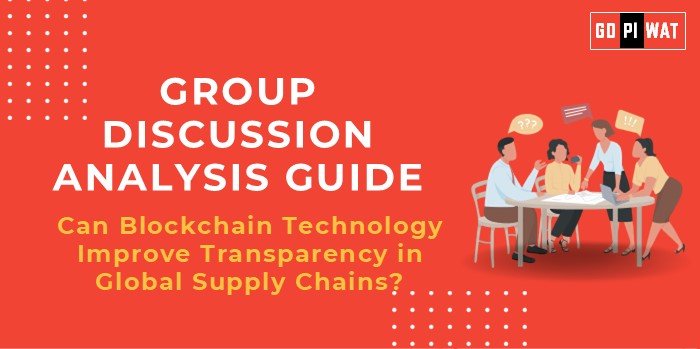📋 Group Discussion (GD) Analysis Guide
🌐 Can Blockchain Technology Improve Transparency in Global Supply Chains?
🌟 Introduction to the Topic
In an increasingly globalized world, supply chain transparency has become critical for ethical sourcing, regulatory compliance, and consumer trust. Blockchain technology, with its decentralized and tamper-proof ledger, is emerging as a revolutionary solution to these challenges.
Blockchain, first introduced as the backbone of cryptocurrency, offers immutable records and smart contract functionalities. In supply chains, it can help track goods from origin to destination, ensuring authenticity and reducing fraud. Global firms like IBM and Walmart have already implemented blockchain in logistics, demonstrating its transformative potential.
📊 Quick Facts and Key Statistics
- 💸 Counterfeit Goods Impact: Global losses due to counterfeiting are estimated at $500 billion annually.
- ⏱️ Food Safety: Walmart reduced food traceability time from 7 days to 2.2 seconds using blockchain technology (Source: IBM Food Trust).
- 📈 Adoption Rate: 38% of global supply chain leaders plan to integrate blockchain within the next five years (Source: Deloitte, 2023).
- 💼 Global Market Size: Blockchain in supply chain management is projected to reach $3.3 billion by 2026, growing at a CAGR of 50% (Source: MarketsandMarkets).
👥 Stakeholders and Their Roles
- Governments: Setting regulations and standards for blockchain usage in supply chains.
- Private Sector: Implementing blockchain solutions for inventory management, tracking, and reporting.
- Consumers: Demanding transparency and ethical practices in sourcing and production.
- NGOs: Advocating for blockchain to ensure compliance with labor laws and environmental standards.
🏆 Achievements and Challenges
🎯 Achievements:
- Enhanced Food Traceability: IBM Food Trust improves food safety by tracing products’ origins within seconds.
- Ethical Sourcing: Everledger uses blockchain to authenticate diamonds, ensuring they are conflict-free.
- Reduction in Fraud: Blockchain prevents tampering with shipping documents and contracts.
⚠️ Challenges:
- High Implementation Costs: Initial investment in blockchain infrastructure is significant.
- Interoperability Issues: Integration with existing supply chain systems can be complex.
- Scalability Concerns: Blockchain networks may face performance issues with large datasets.
🌏 Global Comparisons
- China: Alibaba uses blockchain to track imported food items, ensuring quality and authenticity.
- Estonia: Blockchain underpins e-government services, demonstrating scalability and efficiency.
📜 Structured Arguments for Discussion
- Supporting Stance: “Blockchain ensures data immutability, making supply chains more transparent and trustworthy.”
- Opposing Stance: “The high cost and technical complexity of blockchain hinder its widespread adoption.”
- Balanced Perspective: “While blockchain offers transformative benefits, overcoming interoperability and cost barriers is crucial for its success.”
🗣 Effective Discussion Approaches
- Statistical Opening: “Blockchain can redefine global supply chains by addressing counterfeiting, fraud, and inefficiencies.”
- Case Study Opening: “Transparency in supply chains is essential, and blockchain technology offers a promising solution.”
- Counter-Argument Handling: Emphasize collaborative investments and standardization to overcome cost and interoperability challenges.
⚖️ Strategic Analysis of Strengths and Weaknesses
- Strengths: Immutability, transparency, increased trust among stakeholders.
- Weaknesses: High costs, technical requirements.
- Opportunities: Ethical sourcing, compliance, and global adoption.
- Threats: Regulatory uncertainty, cybersecurity risks.
📚 Connecting with B-School Applications
- Real-World Applications: Blockchain in ethical sourcing, operations efficiency, and logistics optimization.
- Sample Interview Questions:
- “How does blockchain improve traceability in supply chains?”
- “Can blockchain eliminate fraud in global trade?”
- Insights for B-School Students: Explore blockchain’s role in ESG (Environmental, Social, and Governance) and analyze the ROI of blockchain implementation.


